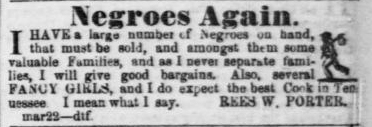- Home >
- North Nashville Heritage Project
- > The Enslaved in Nashville
The Enslaved in Nashville
Human Beings as Commodities
Negroes for Sale
 Throughout the 1850s, Rees W. Porter provided a continuous supply of slaves for prospective buyer at his office on Cedar Street (Charlotte Ave). Although Porter's slave advertisements display a reticence to break up enslaved families, he appears to have had little reservation in providing "Fancy Girls" (concubines) for any who desired them.
Throughout the 1850s, Rees W. Porter provided a continuous supply of slaves for prospective buyer at his office on Cedar Street (Charlotte Ave). Although Porter's slave advertisements display a reticence to break up enslaved families, he appears to have had little reservation in providing "Fancy Girls" (concubines) for any who desired them.
The Public Square
Although there are few places in the city that gives visitors a glimpse into the lives of Nashville’s enslaved population--the brokerage houses where blacks were bought, sold, and traded no longer exist and the narratives that describe their existence have been sanitized, muted, or erased--the history of certain areas of the city reveal a relationship with the “peculiar institution” that was intimate and ubiquitous. Historically, Nashville’s Public Square Park was a place where people met to shop, mingle, conduct business, and celebrate events. However, the history of African Americans in the city provides a different picture of one of the favorite meeting places in Nashville. More than any other place in the city, the square represented the commodification and devaluing of black life in the Music City. It was a space where the horrors of slavery were laid bare, including the disruption of black families for profit or convenience, for the world to see. Fear, uncertainty, and psychological trauma were the defining features of the City Square for the slave.
Negroes Insured
Negroes for Sale
Easy Credit Terms Available
|
US Slave Census 1860-Tennessee |
||||||
|
County |
TOTAL POPULATION |
Total Free Blacks |
Total Slaves |
Total Slaveholders
|
PCT Slaves |
PCT Free |
|
DAVIDSON |
47,055 |
1,209 |
14,790 |
2,153 |
31.4% |
2.6% |
|
RUTHERFORD |
27,918 |
190 |
12,984 |
1,316 |
46.5% |
0.7% |
|
SHELBY |
48,092 |
276 |
16,953 |
2,056 |
35.3% |
0.6% |
|
SUMNER |
22,030 |
103 |
7,700 |
951 |
35.0% |
0.5% |
|
WILLIAMSON |
23,827 |
45 |
12,367 |
1,207 |
51.9% |
0.2% |
|
WILSON |
26,072 |
321 |
7,964 |
1,325 |
30.5% |
1.2% |
|
Tennessee
|
1,109,801 |
7,300 |
275,719 |
36,844 |
24.8% |
0.7% |
Formerly Enslaved African Americans Living in North Nashville During the Great Depression
|
Name |
Address |
|
328 5th Avenue North |
|
|
411 14th Avenue North |
|
|
941 Jefferson Street |
|
|
1209 Jefferson Street |
|
|
1118 Jefferson Street |
|
|
1213 Scovel Street |
|
|
1004 10th Avenue North |
|
|
1025 10th Avenue North |


